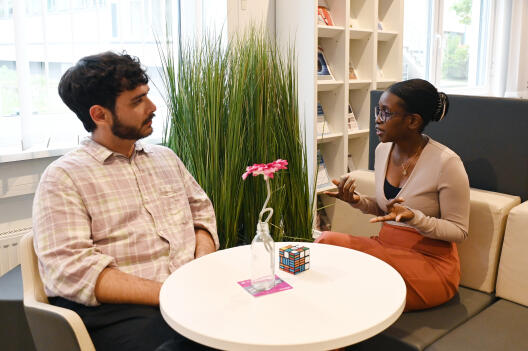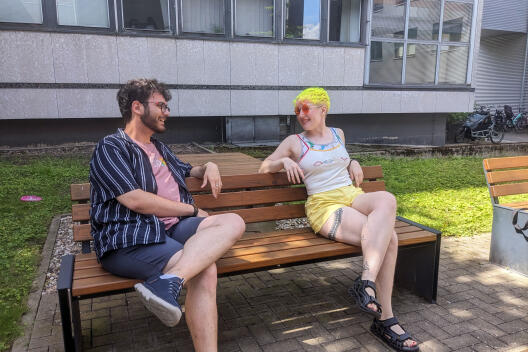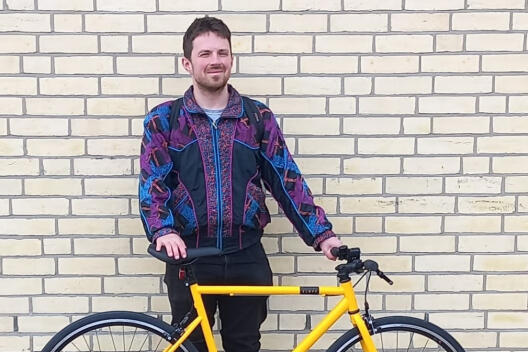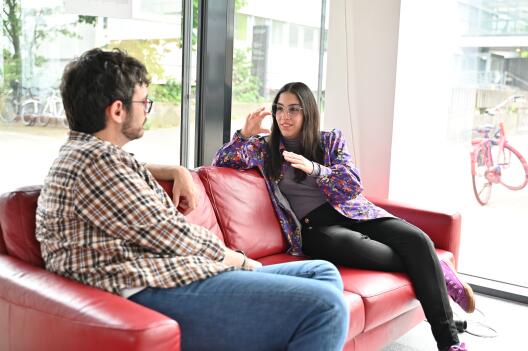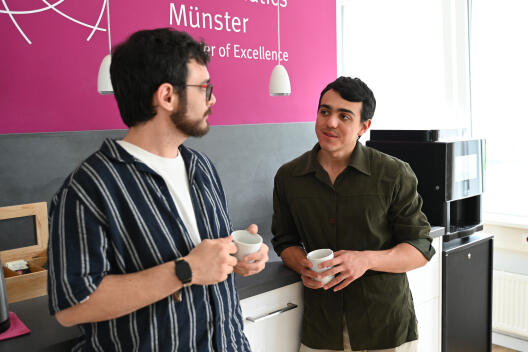Simone: Welcome to On a Tangent, the podcast, where the main characters are the stories behind the mathematics. My name is Simon and in each episode I am joined by a different early career mathematician from Munster to learn about their paths towards mathematics and the hopes for the future. This episode, coming out during Pride Month, I am joined by Azul, a doctoral researcher in set theory. We learn about how the axiom of choice transforms the universes it holds in, how set theory is the mathematics of mathematics, and what's the quickest path to ice cream. I hope you enjoy this episode. (...) So, Azul… Welcome to the podcast.
Azul: Hi. It's nice to be here.
Simone: Yeah. Thank you for joining us. So as you know, in the podcast, we sort of explore the stories of our guests. And so I would like to start from your past. So what is your earliest memory of mathematics?
Azul: Actually I love that question. So when you told me you were going to do this podcast, I ask you what type of questions you would ask. And you told me this example, and I was so glad because I have this story and nobody ever asked me this. And I didn't even know this until you ask me them. So I'm super happy to tell this. So the thing is, when I was a kid, in my hometown, the map of the city is a grid. And there is this main square in the city centre that is a square. So it's 100m times 100m, but it also has a cross in the middle. And one of the things we did with my mom a lot, was walking from my house to the city centre and going to have an ice cream in the corner of the square. And to do that, the best way was to cross the square through the diagonal, right? And most of these, most of the blocks in my city don't have this, it's just that part that you can cross in diagonally. And when I was a kid, I was always thinking, so first, if it was really better, I think, that one I could see, like, I could just look around and see that it was shorter than doing two blocks of 200m. But I always wanted to know precisely…
Simone: How much better.
Azul: How much better it was, because it seemed to me that it was more than one block, but less than two.
Simone: So better than two.
Azul: But yeah. But not like so much better. So… how much. And I was obsessed with this and I was trying to estimate. But it was super hard.
Simone: Getting faster to the ice cream.
Azul: Of course. How much faster are we getting to the ice cream?
Simone: Exactly.
Azul: But there was always trying to do this, and in my mind estimation was like 1.5. I didn't even know decimals I think, at this point. But like half.
Simone: Half. Yeah.
Azul: But I never could answer if the diagonal was less or more than 1.5. And this was just something I had in my mind for a long time.
Simone: Until many years later in school, you suddenly found out?
Azul: Yeah. Yeah, definitely. It was much longer, and I was not even living there anymore. It came the answer ten years later.
Simone: And do you somehow think that this way… Well, this is in a way, a very geometric problem then sort of connects to what you do nowadays in your research. Have you always been a very visual thinker or a geometric thinker?
Azul: I would say so. When I was in a Math Olympiad in high school, my favourite branch of problems was geometry. So Euclidean geometry. So in that regard, yes. But I would say I'm terrible at visual thinking in the sense of… It's very hard for me to imagine figures. Okay. In that sense I would say no, but because I cannot imagine so much, then I would draw things. I mean, I like to compensate this lack of imagination with like doing diagrams and drawings to help myself.
Simone: And so… I just sort of already went into this topic: what is it, that you do nowadays in research?
Azul: So I'm studying set theory. That's the branch. It's inside logic, as you know.
Simone: Of course. We finally have a logician on the podcast.
Azul: Yes. I mean, it's easier to tell you, right?
Simone: Of course. But for our audience…
Azul: Yes. So I study problems that are related with the axiom of choice and the subsets of the real numbers. So somehow the objects are very much like normal math, let's say. And there are some geometrical objects that I study. But from the perspective of the theory, because the questions are related to how much axiom of choice do you need to construct these objects or not, which is essentially a set theoretic question.
Simone: Yes. And is this how you explain it to non maths friends? If they ask, of course.
Azul: Of course not. I mean they don't know what axiom of choice is.
Simone: And why set theory is important for people I mean.
Azul: I mean, I don't even know if a mathematician… I'm not sure mathematicians know why set theory is important in general, I think. Yeah.
Simone: Except for the fact that, I mean, yes, this is the foundation.
Azul: That's it. Not mathematicians. I usually say I do something in logic. Logic is a word that people know, right? And I mean, of course they don't know what logic, mathematical logic means, but there is a concept of logic, an idea. And then if they ask me more, I say, okay, there is a branch of logic that is set theory that studies more or less the foundations of math and the structure of how math works. So there are these meta mathematical questions that set theory takes care of.
Simone: I think I usually tell people we do, like what linguists do to the real world, like, people study the language in which people communicate and logicians study the linguistics of mathematics.
Azul: Yeah, it could be.
Simone: In terms of funding, probably it's a similar parallel.
Azul: In terms of funding?
Simone: We get as much funding as the linguistics people.
Azul: Yes. I'm not sure I don't have any idea of this.
Simone: Yeah. But I imagined it’s not much, as all humanities people.
Azul: I mean, I agree on what you're saying, but in particular set theory I like more to simplify as the math of math. I think because you're not using linguistics to study, you know, the language of real life, it's like a different thing. Right? Linguistics is different from real world or, or the language that is spoken. But the theory is itself a part of math. And I think that's one of the most beautiful things.
Simone: And the most confusing.
Azul: And it's super confusing. But this thing… I mean, math can study things that are things of math. And when you say this to people, even if they are not mathematicians, it is like, what? How do you do that?
Simone: Yeah. And I do remember my first set theory class, there is all the sort of paradoxes which seem to stem from the fact that you actually talk about set theory when you do the set theory of math. I mean, when you do the maths of maths, you're in particular studying the maths. I mean, you know…
Azul: Yeah, there's this self-reference. Self-reference at the beginning.
Simone: Yes. I mean, it is confusing. I mean, it's also something to explore.
Azul: Well it's definitely both for me. The fact that is so weird in a sense, in comparison to other branches that don't have this feature makes it more interesting.
Simone: And so your research deals with sort of, let's say, normal mathematical objects, which if another mathematician said this to me, that it would be offensive, but we can say it. Yeah. I mean, you know, because if somebody told me, ah, yeah, we do the normal mathematics, you do the logic, I would be a bit offended. But I can say, you know, the natural mathematical objects that you find in nature and in nature, well, you know, in nature, like in, in mathematics, I mean, mathematical nature. In mathematical nature. Exactly. And you often hear about how the axiom of choice builds these sort of paradoxical objects. Is this the kind of things you're interested in?
Azul: Yeah. So my PhD thesis is called paradoxical sets and the axiom of choice. That's definitely the object. And yeah, I agree this about the normal math and not normal math.
Simone: But would paradoxical sets be considered a normal mathematical object.
Azul: Yeah, I think so. I mean, for example, you have this example that I think is one of the most well known. I think that is the Vitali set. So the standard example of a non measurable set in the reals. And this is I mean this is part of the course of real analysis. This is just something most of people would have seen at some point or Banach-Tarski that is so famous. And, well some people don't like actually Banach-Tarski, like it's weird. Right. But for example, the Vitali set is really a part of understanding of measure theory.
Simone: No, we don't work in the, … what is it? The Solovay paradise where all sets are measurable?
Azul: Yeah, exactly. So, I mean, but of course, when you start asking a theoretical question, then the object kind of doesn't satisfy the same role as if it is because you're not studying the object itself, but rather also or in my case, which are the axioms you need to construct, or how consistent is this existence of this object with some other set of axioms or some other objects? So, even if the name is right the same, like Vitali set, then what you're doing with it is very… different, you know.
Simone: You’re not studying the properties of it, but rather what, what its existence says about the universe you find it in.
Azul: Yeah, somehow. Where does it lie? In the map of things.
Simone: And I know you're not meant to play favourites, but what is your favourite paradoxical set?
Azul: What is my favourite paradoxical set? Let's see. Well, I think if I have to pick one, it would be the one I thought more about. So there is this theorem in ZFC. So using the axiom of choice. That R3 can be partitioned. So the space can be partitioned in circles, so only with the border. And these circles can be taken to have radius one. So they are all the same radius. But still, you can cover R3.
Simone: Which is, I think you the first time you hear it, like of course I can do this. And then you mentally start placing circles one into the other and then very quickly get to the point where you don't know where to place the next one. Right?
Azul: Exactly. I mean, you can put more and more circles, right? Because each one is kind of small in inside the space. But how would you end up completing everything over there?
Simone: Yes.
Azul: Yeah. Like, imagine you put a lot of circles and like it's dense in R3. But there is some space that you have to fill. If you have like some isolated points, for example, then of course you cannot do it. So even if you have like a full circle, but a few points are not already taken, then you cannot put a circle again.
Simone: So this means you did it wrongly from the start?
Azul: Yes. I mean at some point there was something that you did that didn't allow to continue the procedure. Right. But there is a way to do this process, wisely so that this doesn't happen. And this is a theorem of ZFC. So you really need the axiom of choice. Well, less than that, but some form of choice. Some part of choice. Yeah. I think this is my favourite. It’s nice that you can tell people you are studying something like this.
Simone: Because they can visualise it.
Azul: They can visualise it is just Euclidean geometry. So I can even tell my family about this if they are patient enough to hear this.
Simone: Yeah. Or to look at the pictures at least.
Azul: Yes.
Simone: And do you feel like because this feels a lot like one of those problems in number theory where the statement is very easy. But then the math behind it is very complicated. So I presume in a similar way the problem can be stated very easily. But then proving it is not Euclidean geometry is actually.
Azul: Yes. So the proof of this theorem is not well, of course it has some Euclidean geometry because the object is. But the main tool is doing transfinite induction on the cardinality of the reals, whatever that is. But the point is you do this induction, but it's longer than the natural numbers, but even more. You keep going after you did countable many steps, and then you keep going. Yes. And then you keep going on and you keep going until you reach the cardinality of the reals, which is the same cardinality of all the points in the space that you have to cover. So this tool is not from Euclidean geometry. It's set theoretical. So the existence of this paradoxical set already has a proof that is set theoretical.
Simone: So you said you need less than choice. So maybe something like a, well, ordering of the reals or dependent choice, whatever this means for the non logicians. But then maybe in the vein of what we said before, from the existence of this set, just so you look sort of look at some universe where the set exists. Can you then say anything about what axioms are true in this universe? If, for example, is some amount of choice still true?
Azul: Right. So that's exactly the questions we were trying to think of while my PhD was happening and so basically the answer is no. There is I mean, you could have this set and basically no choice. I mean. This, you can formalise this. For example, there is this concept of countable choice. Doing the choice countable many times. And we got the result that there is a model of the theory in which you have this set, so this partition of the space in unit circles, but you still you don't even have countable choice.
Simone: And I guess for the non logicians or maybe even for the non set theorists, the striking idea is building a model of set theory because it's kind of feels like building a universe of but we are in one. So it's a bit confusing.
Azul: Of course.
Simone: If you start thinking about this philosophically you can go on for hours, I guess. But yes. How does one build a like a universe of set theory or model of set theory?
Azul: I mean, I think that's the full thing of what a theory does, building models of set theory that satisfy the things you want. So how do you build the model? Well, first you assume there is one.
Simone: Which is already… Yeah.
Azul: And then from there, I mean, there are many techniques. So one way to build a model is build a smaller model, inside the one you have. So from all the sets you have in your model, let's take only the definable sets which have some definition and then you'll get something in principle, smaller. It could be strictly smaller. It could be all of it, depending on what you're doing. But there is also a way to construct bigger models. Okay. So there is this technique that is called forcing that allows you from a model and some other elements, construct a bigger model than the one you started with. So those are the two ways people do it.
Simone: I think I remember in my set theory class, it was described to me as… So in the model, there are people and they believe in some sort of like entity. They know sort of how this entity looks like. They know some things, you know. Like so in the first thing you have some properties encoded, but then you sort of look up at the sky and this entity doesn't exist. But then like in the level above, the entity is there and looks down on the people and sort of has an effect on them. So it's a bit like religion, which I don't know. I mean, you do have a lot of cardinals in set theory.
Azul: I do think it's a bit like that. So I don't know if you know this. Is it a book or…, I think it's a book.
Simone: The higher set theory?
Azul: No, no. Nothing to do with this. Okay. Flat something.
Simone: Flatlandia.
Azul: Flatlandia. Yeah. Is it English?
Simone: Flatland.
Azul: Maybe. Flatland.
Simone: Yeah.
Azul: Yes, flatland. I didn't know it in English. Sorry. So in flatland, there is this people that cannot. Well, actually, did I read this book?
Simone: I'm sure I read it in school, like, when I was very young.
Azul: Yeah, but. So the point is, if you are in flatland, you cannot see three dimensional things, right? You're a circle. Yeah, or a square or something. But then a sphere in flatland is like a circle that moves and has different radius. Right. Because depending on the section of the sphere, the circle changes. So somehow from flatland you can see this three dimensional things as another thing which is not three dimensional, right. Because you cannot but you can guess what it is somehow and can imagine what three dimensionality is by all the sections, for example. And this is more or less what forcing is. Yeah, it's a simplification of course. But what forcing is about. So from the original model you can kind of imagine what the exterior model would be like.
Simone: And so from your research you're doing nowadays, let's maybe look into the future a bit. What is something you would like to see prove in the next ten years by somebody? Not necessarily by you, but… some questions you would like to see answered?
Azul: I don't know. I think I would like… so I have this maybe vision about what I want to do in. I don't know the future very abstractly in general at some point with math, and it is trying to connect a set theory with, yeah, like subset of the reals or things that are like normal math now.
Simone: That you find in nature.
Azul: Yes, I am not comfortable with it.
Simone: I think I often say, you know, model theory does logic on objects found in nature. This is what I usually say.
Azul: Well, yeah, I don't feel it is in nature. Right. So, I feel uncomfortable with that concept. In theory the real numbers, for example, are not the real line. If you tell any mathematician, imagine the real numbers, they probably imagine the real line or maybe they just say pi or something. But the set of reals, which is the set of reals? They will draw a line. And for the set theorists usually it is not. For example the power set of the natural numbers or all the functions from the natural numbers to the natural numbers or things like this. Like there are several sets that we consider them all as the real numbers. They are all bijection with each other. So for most of the questions, this is the same if you care, for example, only about the cardinality of that set, then they are all the same. But for the objects I'm looking at, for example circles in the space. You are thinking about the real line. I mean, the space is three times the real line. So you have to look at the reals as the real line to just approach these questions. So what I would like to be solved is the things I'm curious about, of course. Which is this abstract idea of some theoretical questions that are related to the reals as the reals of the mathematicians, which is the real line.
Simone: Mhm. To do a more geometric version of the reals.
Azul: So yeah, but not only, I mean, even if you consider it for example the reals as a field, it's also something that is not… I mean, the power set of the natural numbers is not a field.
Simone: It’s just a set.
Azul: Yes. So even if you ask more algebraic questions, this also has to do with this view that I have, that we have a gap there.
Simone: Okay. Well thank you very much for the insights!
Azul: Thank you so much.
Simone: See you in the corridors.




